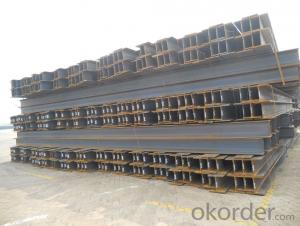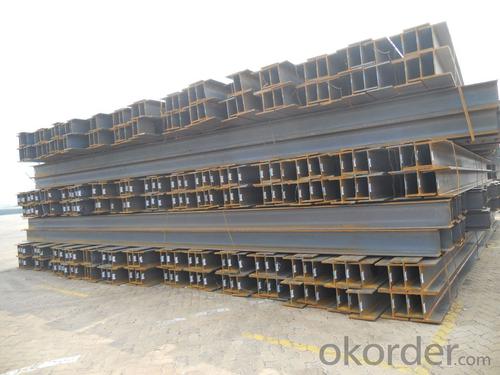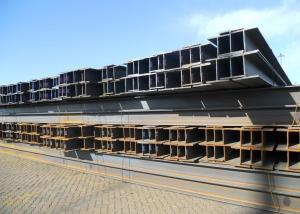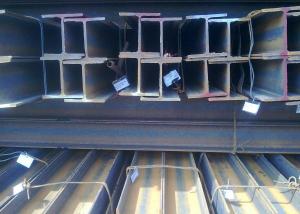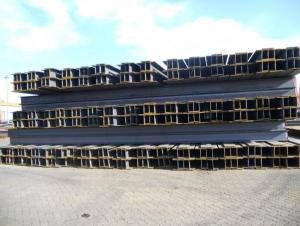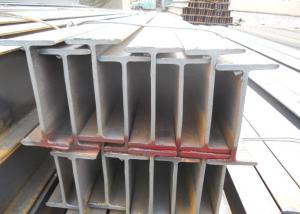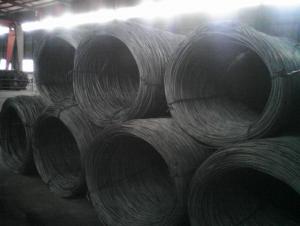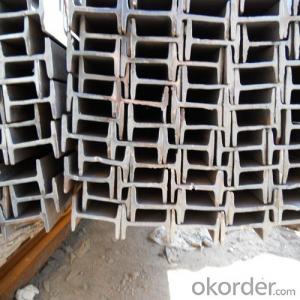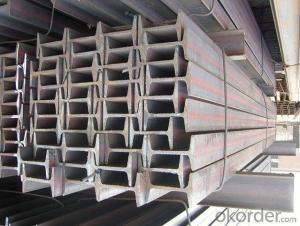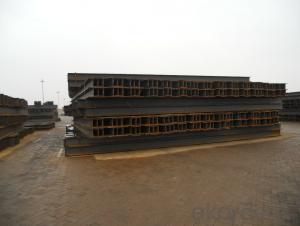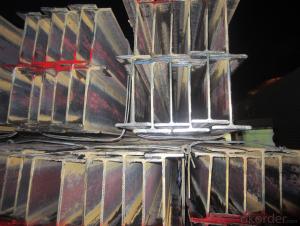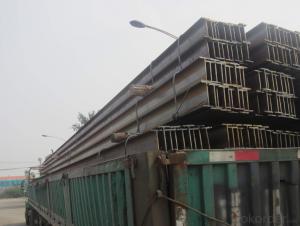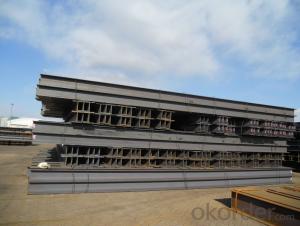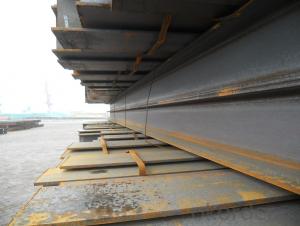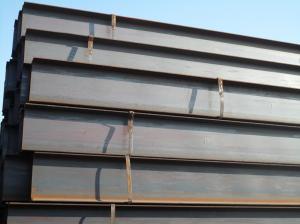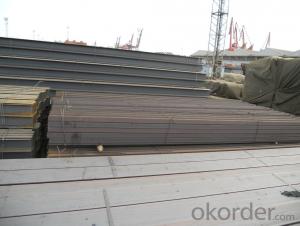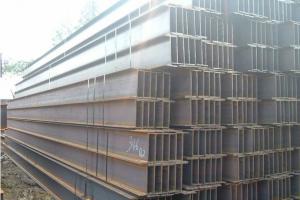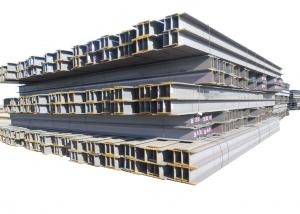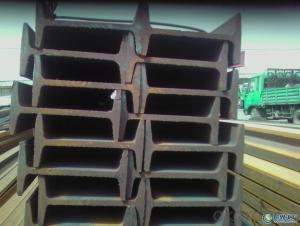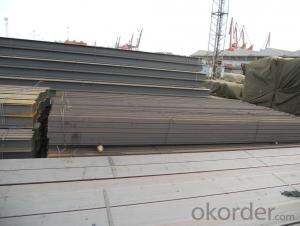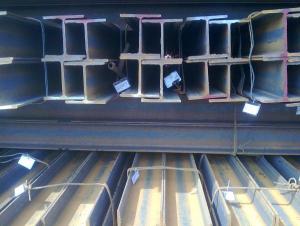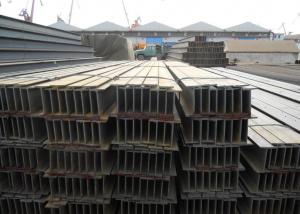High Quality Hot Rolled Jis Steel H Beam
- Loading Port:
- Tianjin
- Payment Terms:
- TT OR LC
- Min Order Qty:
- 25 m.t.
- Supply Capability:
- 1000 m.t./month
OKorder Service Pledge
OKorder Financial Service
You Might Also Like
roduct Description:
Specifications of Hot Rolled Steel H-beam
1. Standard: GB
2. Grade: Q235 or Equivalent
3. Length: 6m,10m, 12m as following table
4. Invoicing on theoretical weight or actual weight as customer request
5.Payment: TT or L/C
6. Sizes:
Category | model (height*width)/ (mm×mm) | Section size/mm | Cross-section area/cm2 | Theoretical Weight/(kg/m) | Moment of inertia/cm4 | radius/cm | Section modulus/cm3 | |||||||
H | B | t1 | t2 | r | Ix | Iy | ix | iy | Wx | Wy | ||||
HW | 100×100 | 100 | 100 | 6 | 8 | 8 | 21.59 | 16.9 | 386 | 134 | 4.23 | 2.49 | 77.1 | 26.7 |
125×125 | 125 | 125 | 6.5 | 9 | 8 | 30.00 | 23.6 | 843 | 293 | 5.30 | 3.13 | 135 | 46.9 | |
150×150 | 150 | 150 | 7 | 10 | 8 | 39.65 | 31.1 | 1620 | 563 | 6.39 | 3.77 | 216 | 75.1 | |
175×175 | 175 | 175 | 7.5 | 11 | 13 | 51.43 | 40.4 | 2918 | 983 | 7.53 | 4.37 | 334 | 112 | |
200×200 | 200 | 200 | 8 | 12 | 13 | 63.53 | 49.9 | 4717 | 1601 | 8.62 | 5.02 | 472 | 160 | |
200 | 204 | 12 | 12 | 13 | 71.53 | 56.2 | 4984 | 1701 | 8.35 | 4.88 | 498 | 167 | ||
250×250 | 244 | 252 | 11 | 11 | 13 | 81.31 | 63.8 | 8573 | 2937 | 10.27 | 6.01 | 703 | 233 | |
250 | 250 | 9 | 14 | 13 | 91.43 | 71.8 | 10689 | 3648 | 10.81 | 6.32 | 855 | 292 | ||
250 | 255 | 14 | 14 | 13 | 103.93 | 81.6 | 11340 | 3875 | 10.45 | 6.11 | 907 | 304 | ||
HM | 150×100 | 148 | 100 | 6 | 9 | 8 | 26.35 | 20.7 | 995.3 | 150.3 | 6.15 | 2.39 | 134.5 | 30.1 |
200×150 | 194 | 150 | 6 | 9 | 8 | 38.11 | 29.9 | 2586 | 506.6 | 8.24 | 3.65 | 266.6 | 67.6 | |
250×175 | 244 | 175 | 7 | 11 | 13 | 55.49 | 43.6 | 5908 | 983.5 | 10.32 | 4.21 | 484.3 | 112.4 | |
HN | 100×50 | 100 | 50 | 5 | 7 | 8 | 11.85 | 9.3 | 191.0 | 14.7 | 4.02 | 1.11 | 38.2 | 5.9 |
125×60 | 125 | 60 | 6 | 8 | 8 | 16.69 | 13.1 | 407.7 | 29.1 | 4.94 | 1.32 | 65.2 | 9.7 | |
150×75 | 150 | 75 | 5 | 7 | 8 | 17.85 | 14.0 | 645.7 | 49.4 | 6.01 | 1.66 | 86.1 | 13.2 | |
175×90 | 175 | 90 | 5 | 8 | 8 | 22.90 | 18.0 | 1174 | 97.4 | 7.16 | 2.06 | 134.2 | 21.6 | |
200×100 | 198 | 99 | 4.5 | 7 | 8 | 22.69 | 17.8 | 1484 | 113.4 | 8.09 | 2.24 | 149.9 | 22.9 | |
200 | 100 | 5.5 | 8 | 8 | 26.67 | 20.9 | 1753 | 133.7 | 8.11 | 2.24 | 175.3 | 26.7 | ||
250×125 | 248 | 124 | 5 | 8 | 8 | 31.99 | 25.1 | 3346 | 254.5 | 10.23 | 2.82 | 269.8 | 41.1 | |
250 | 125 | 6 | 9 | 8 | 36.97 | 29.0 | 3868 | 293.5 | 10.23 | 2.82 | 309.4 | 47.0 | ||
300×150 | 298 | 149 | 5.5 | 8 | 13 | 40.80 | 32.0 | 5911 | 441.7 | 12.04 | 3.29 | 396.7 | 59.3 | |
300 | 150 | 6.5 | 9 | 13 | 46.78 | 36.7 | 6829 | 507.2 | 12.08 | 3.29 | 455.3 | 67.6 | ||
350×175 | 346 | 174 | 6 | 9 | 13 | 52.45 | 41.2 | 10456 | 791.1 | 14.12 | 3.88 | 604.4 | 90.9 | |
350 | 175 | 7 | 11 | 13 | 62.91 | 49.4 | 12980 | 983.8 | 14.36 | 3.95 | 741.7 | 112.4 | ||
400×150 | 400 | 150 | 8 | 13 | 13 | 70.37 | 55.2 | 17906 | 733.2 | 15.95 | 3.23 | 895.3 | 97.8 | |
HT | 100×50 | 95 | 48 | 3.2 | 4.5 | 8 | 7.62 | 6.0 | 109.7 | 8.4 | 3.79 | 1.05 | 23.1 | 3.5 |
97 | 49 | 4 | 5.5 | 8 | 9.38 | 7.4 | 141.8 | 10.9 | 3.89 | 1.08 | 29.2 | 4.4 | ||
100×100 | 96 | 99 | 4.5 | 6 | 8 | 16.21 | 12.7 | 272.7 | 97.1 | 4.10 | 2.45 | 56.8 | 19.6 | |
125×60 | 118 | 58 | 3.2 | 4.5 | 8 | 9.26 | 7.3 | 202.4 | 14.7 | 4.68 | 1.26 | 34.3 | 5.1 | |
120 | 59 | 4 | 5.5 | 8 | 11.40 | 8.9 | 259.7 | 18.9 | 4.77 | 1.29 | 43.3 | 6.4 | ||
125×125 | 119 | 123 | 4.5 | 6 | 8 | 20.12 | 15.8 | 523.6 | 186.2 | 5.10 | 3.04 | 88.0 | 30.3 | |
150×75 | 145 | 73 | 3.2 | 4.5 | 8 | 11.47 | 9.0 | 383.2 | 29.3 | 5.78 | 1.60 | 52.9 | 8.0 | |
147 | 74 | 4 | 5.5 | 8 | 14.13 | 11.1 | 488.0 | 37.3 | 5.88 | 1.62 | 66.4 | 10.1 | ||
150×100 | 139 | 97 | 4.5 | 4.5 | 8 | 13.44 | 10.5 | 447.3 | 68.5 | 5.77 | 2.26 | 64.4 | 14.1 | |
142 | 99 | 4.5 | 6 | 8 | 18.28 | 14.3 | 632.7 | 97.2 | 5.88 | 2.31 | 89.1 | 19.6 | ||
150×150 | 144 | 148 | 5 | 7 | 8 | 27.77 | 21.8 | 1070 | 378.4 | 6.21 | 3.69 | 148.6 | 51.1 | |
147 | 149 | 6 | 8.5 | 8 | 33.68 | 26.4 | 1338 | 468.9 | 6.30 | 3.73 | 182.1 | 62.9 | ||
175×90 | 168 | 88 | 3.2 | 4.5 | 8 | 13.56 | 10.6 | 619.6 | 51.2 | 6.76 | 1.94 | 73.8 | 11.6 | |
171 | 89 | 4 | 6 | 8 | 17.59 | 13.8 | 852.1 | 70.6 | 6.96 | 2.00 | 99.7 | 15.9 | ||
175×175 | 167 | 173 | 5 | 7 | 13 | 33.32 | 26.2 | 1731 | 604.5 | 7.21 | 4.26 | 207.2 | 69.9 | |
172 | 175 | 6.5 | 9.5 | 13 | 44.65 | 35.0 | 2466 | 849.2 | 7.43 | 4.36 | 286.8 | 97.1 | ||
200×100 | 193 | 98 | 3.2 | 4.5 | 8 | 15.26 | 12.0 | 921.0 | 70.7 | 7.77 | 2.15 | 95.4 | 14.4 | |
196 | 99 | 4 | 6 | 8 | 19.79 | 15.5 | 1260 | 97.2 | 7.98 | 2.22 | 128.6 | 19.6 | ||
200×150 | 188 | 149 | 4.5 | 6 | 8 | 26.35 | 20.7 | 1669 | 331.0 | 7.96 | 3.54 | 177.6 | 44.4 | |
Usage & Applications of Hot Rolled Steel H-beam
Commercial building structure ;Pre-engineered buildings; Machinery support structure; Prefabricated structure; Medium scale bridges; Ship-building structure. etc.
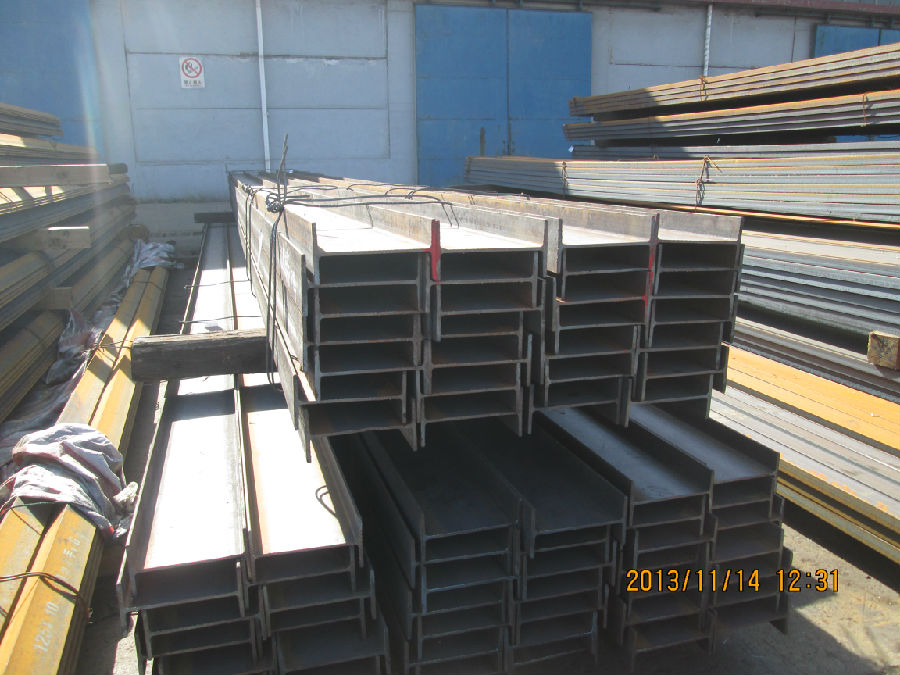
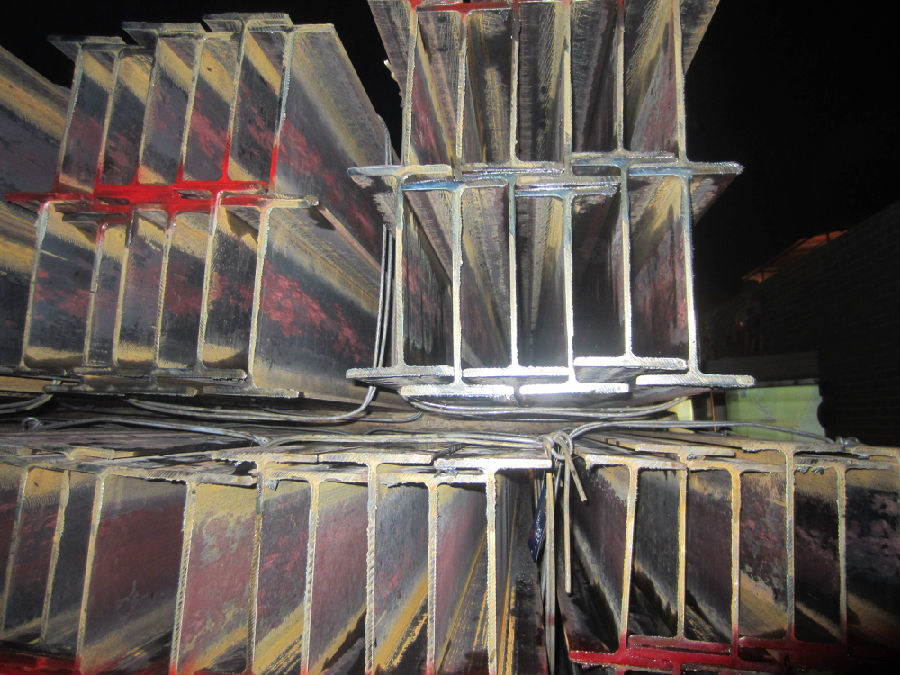
Packaging & Delivery of Hot Rolled Steel H-beam
1. Packing: it is nude packed in bundles by steel wire rod
2. Bundle weight: not more than 3.5MT for bulk vessel; less than 3 MT for container load
3. Marks:
Color marking: There will be color marking on both end of the bundle for the cargo delivered by bulk vessel. That makes it easily to distinguish at the destination port.
Tag mark: there will be tag mark tied up on the bundles. The information usually including supplier logo and name, product name, made in China, shipping marks and other information request by the customer.
If loading by container the marking is not needed, but we will prepare it as customer request.
4. Transportation: the goods are delivered by truck from mill to loading port, the maximum quantity can be loaded is around 40MTs by each truck. If the order quantity cannot reach the full truck loaded, the transportation cost per ton will be little higher than full load.
5. Delivered by container or bulk vessel
Production flow of Hot Rolled Steel H-beam
Material prepare (billet) —heat up—rough rolling—precision rolling—cooling—packing—storage and transportation
- Q: What are the factors to consider when selecting steel H-beams for a construction project?
- When selecting steel H-beams for a construction project, there are several important factors to consider. 1. Load-bearing capacity: The primary purpose of H-beams is to provide structural support and bear heavy loads. Therefore, it is crucial to determine the anticipated load requirements for the construction project. The load-bearing capacity of H-beams is typically specified by their height, thickness, and the type of steel used. 2. Size and dimensions: H-beams come in various sizes and dimensions, and it is essential to select the appropriate size that can adequately support the structure. The height, width, and thickness of the beam should be carefully chosen based on the design requirements and anticipated loads. 3. Steel grade: The selection of steel grade is crucial as it determines the strength and durability of the H-beams. Different steel grades have varying mechanical properties, such as yield strength and tensile strength. It is important to consult with a structural engineer or steel supplier to identify the suitable steel grade for the project. 4. Cost-effectiveness: While ensuring the structural integrity of the construction project is paramount, it is also crucial to consider the cost-effectiveness of the selected H-beams. Comparing prices from different suppliers and considering factors such as transportation costs and availability can help in making an informed decision. 5. Compatibility with other materials: H-beams are often used in conjunction with other construction materials, such as concrete or wood. It is important to ensure that the selected H-beam is compatible with these materials and can be easily integrated into the overall design and construction process. 6. Quality and certification: When selecting steel H-beams, it is essential to ensure that they meet the required quality standards and are certified by relevant authorities. This helps ensure that the beams have been manufactured using appropriate processes and adhere to industry standards. In conclusion, when selecting steel H-beams for a construction project, factors such as load-bearing capacity, size and dimensions, steel grade, cost-effectiveness, compatibility with other materials, and quality and certification should be carefully considered to ensure the structural integrity and success of the project.
- Q: What are the common fabrication techniques used for steel H-beams?
- Steel H-beams are fabricated using several common techniques, including hot rolling, welding, and cutting. The primary fabrication technique for producing steel H-beams is hot rolling. This involves heating a large steel billet and passing it through a series of rollers to shape it into the desired H-beam profile. Through this process, H-beams with consistent dimensions and excellent structural integrity are created. Welding is another crucial technique used in fabricating steel H-beams. It entails joining multiple steel plates or sections together to form the H-beam shape. Welding can be performed using various techniques, such as arc welding, MIG welding, or TIG welding, depending on the project's specific requirements. By creating a continuous and seamless connection between the different components, welding enhances the strength and rigidity of the H-beam. Cutting is also a widely employed technique in the fabrication of steel H-beams. It involves removing excess material to achieve the desired dimensions and shape. Various cutting methods, such as sawing, shearing, or plasma cutting, can be utilized. This process ensures precise and accurate shaping of the H-beam, meeting the required specifications. In summary, these fabrication techniques are vital for the production of steel H-beams as they guarantee their structural integrity, dimensional accuracy, and overall quality.
- Q: How do steel H-beams perform in extreme weather conditions?
- Steel H-beams are renowned for their exceptional strength and durability, making them applicable to a wide range of uses, including construction and engineering projects. However, it is vital to consider the performance of steel H-beams in extreme weather conditions. In general, steel exhibits a high level of resistance to adverse weather conditions, such as extreme heat, cold, rain, and wind. Specifically, H-beams are engineered to withstand heavy loads and provide structural support, indicating their capability to endure harsh weather conditions. One significant advantage of steel H-beams in extreme weather conditions lies in their resistance to corrosion. Steel possesses inherent resistance to rust and deterioration, and additional protective coatings can further enhance its resistance. Consequently, steel H-beams remain a dependable choice even in environments with high humidity or exposure to saltwater. Under extreme heat, steel H-beams possess a high melting point and can endure elevated temperatures without compromising their structural integrity. This quality renders them suitable for regions prone to wildfires or intense heatwaves. Similarly, in cold weather conditions, steel H-beams retain their strength and stability without becoming brittle or losing their load-bearing capacity. Consequently, they ensure the structural integrity of buildings and infrastructure even in freezing temperatures. Steel H-beams also exhibit favorable performance in extreme wind conditions. Their sturdy construction and effective load distribution make them resistant to strong winds, minimizing the risk of structural damage during storms or hurricanes. Nevertheless, it is crucial to recognize that extreme weather conditions can affect structures differently, necessitating additional precautions based on specific circumstances. Factors such as design, material quality, and proper maintenance play pivotal roles in ensuring the performance of steel H-beams in extreme weather conditions. Overall, steel H-beams generally excel in extreme weather conditions due to their strength, durability, and corrosion resistance. Nonetheless, it is always advisable to consult structural engineers and adhere to appropriate guidelines to guarantee the safety and longevity of structures in such conditions.
- Q: How do steel H-beams contribute to the overall durability of a structure?
- Steel H-beams contribute to the overall durability of a structure in several ways. Firstly, the unique design of H-beams provides excellent load-bearing capabilities, allowing them to support heavy loads and withstand high levels of stress. This makes them ideal for use in construction projects where structural integrity is paramount. Additionally, the use of steel in H-beams ensures their strength and durability. Steel is known for its high tensile strength, which means it can resist bending and deformation under pressure. This robustness helps prevent the beams from warping or collapsing, even when subjected to significant external forces. Furthermore, steel H-beams are highly resistant to corrosion and other forms of environmental damage. This ensures their longevity and reduces the need for frequent maintenance or repairs. Steel's resistance to fire and exposure to harsh elements also enhances the overall durability of the structure. Another factor contributing to the durability of H-beams is their versatility. These beams can be customized to fit specific design requirements, allowing for efficient distribution of weight and load across the structure. This flexibility ensures that the building can withstand diverse conditions and external factors more effectively. In conclusion, steel H-beams contribute to the overall durability of a structure through their load-bearing capabilities, high tensile strength, resistance to corrosion and environmental damage, and versatility in design. Their ability to withstand heavy loads, resist deformation, and maintain structural integrity over time makes them a crucial component in ensuring the long-lasting durability of any construction project.
- Q: Can steel H-beams be used in industrial warehouses?
- Yes, steel H-beams can be used in industrial warehouses. Steel H-beams are commonly used in construction and industrial applications, including warehouses. They are strong, durable, and provide excellent structural support. The H-shape of the beams allows for a larger load-bearing capacity, making them ideal for supporting heavy loads and large spans. Additionally, steel H-beams can be easily fabricated, installed, and adjusted to meet the specific requirements of the warehouse structure. These beams offer a cost-effective and efficient solution for constructing industrial warehouses.
- Q: Can steel H-beams be used in the construction of exhibition halls or convention centers?
- Indeed, exhibition halls and convention centers can make effective use of steel H-beams in their construction. These beams are widely utilized in the field of construction due to their remarkable strength and durability. They offer exceptional structural support and have the ability to bear heavy loads, rendering them highly suitable for the construction of expansive buildings such as exhibition halls and convention centers. The H-shape of these beams guarantees enhanced stability and resistance against bending, making them a perfect choice for the creation of wide-span structures. Moreover, steel H-beams can be easily manufactured and installed, resulting in time and cost savings during the construction process. Consequently, steel H-beams have gained significant popularity as a reliable and robust framework for the construction of exhibition halls and convention centers.
- Q: Can steel H-beams be used in architectural design elements?
- Indeed, architectural design elements can make excellent use of steel H-beams. Due to their strength and durability, steel H-beams are widely favored in the construction industry. They serve as reliable structural supports in various large-scale projects, including buildings and bridges. However, their versatility extends beyond mere support, as they can also contribute to the creation of distinctive and visually captivating structures. Architects can incorporate steel H-beams in diverse ways, such as exposed beams, columns, or even decorative elements. The sleek and contemporary appearance of these beams can infuse architectural designs with an industrial or modern aesthetic. Moreover, their ability to bear heavy loads and span considerable distances makes them ideal for crafting open and spacious interior spaces. All in all, steel H-beams provide architects with a practical and adaptable solution for integrating structural elements into their designs, while simultaneously introducing a unique visual allure.
- Q: What are the requirements for steel H-beams in hurricane-prone regions?
- The requirements for steel H-beams in hurricane-prone regions typically include a higher grade of steel with increased strength and ductility to withstand high winds and potential impacts from flying debris. The beams may need to be designed to resist lateral forces, such as uplift and lateral loads, and may require additional bracing or connections for enhanced stability. Additionally, they may need to meet specific building codes and regulations set forth by local authorities to ensure the safety and resilience of structures in hurricane-prone areas.
- Q: Can steel H-beams be used for industrial warehouses?
- Yes, steel H-beams can definitely be used for industrial warehouses. In fact, they are commonly used in the construction of such structures due to their strength, durability, and versatility. H-beams provide excellent load-bearing capabilities, making them ideal for large-scale buildings like warehouses, which often require heavy equipment and storage of goods. Additionally, steel H-beams are resistant to fire, pests, and natural elements, ensuring the safety and long-term durability of the warehouse. They also allow for flexible design options, allowing architects and engineers to create spacious and open layouts. Overall, steel H-beams are an excellent choice for industrial warehouses due to their strength, durability, and adaptability to various construction needs.
- Q: How do steel H-beams perform in high wind areas?
- Steel H-beams have gained a reputation for possessing exceptional strength and durability, making them a favored option for construction in regions with high wind conditions. These beams are specifically designed to withstand extreme weather, including powerful winds, by providing a sturdy and stable framework for buildings and structures. The structural design of steel H-beams allows for the efficient distribution of wind load throughout the entire structure, which minimizes the potential for any damage. The unique shape of the H-beam enables it to bear heavier loads, as it can better resist the bending and twisting forces caused by high winds. This ensures that the beams remain stable, preventing any structural failures or collapses. Moreover, steel H-beams are commonly crafted from high-strength steel alloys, which further enhances their ability to endure high winds. These alloys possess superior tensile strength and elasticity, enabling the beams to flex and absorb the energy from wind gusts without permanently distorting or fracturing. This flexibility aids in dissipating the force of the wind and reducing overall stress on the structure. Additionally, steel H-beams are frequently installed as part of a comprehensive structural system that incorporates other components, including bracing, connectors, and fasteners. These elements work together to enhance the performance of the beams in high wind regions. Properly engineered connections and bracing systems effectively transfer the wind load to the foundation, ensuring the overall stability and integrity of the structure. In conclusion, steel H-beams are well-suited for regions with high wind conditions due to their strength, rigidity, and durability. Their efficient load distribution capabilities, high-strength alloys, and compatibility with other structural components make them a reliable choice for buildings and structures in areas prone to strong winds.
Send your message to us
High Quality Hot Rolled Jis Steel H Beam
- Loading Port:
- Tianjin
- Payment Terms:
- TT OR LC
- Min Order Qty:
- 25 m.t.
- Supply Capability:
- 1000 m.t./month
OKorder Service Pledge
OKorder Financial Service
Similar products
Hot products
Hot Searches
Related keywords
